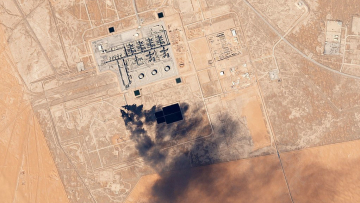HSBC customer of 65 years and member of 10th Gurkhas confronts shareholders with video message over fossil fuels at AGM

- Huge van-mounted digital screen parked outside HSBC AGM playing video of long-standing customer, 83-year-old Christopher Martin.
- Having held his HSBC account for 65 years since serving in the 10th Gurkhas, Mr Martin is now leaving over HSBC’s continued financing of fossil fuels.
- International Energy Agency states as of last year, no new coal mines, coal plants or oil and gas fields can be built if we are to keep global warming below 1.5°C.
- More photos here. The video can be viewed online here. Video credit: Market Forces / Dan Watts
HSBC shareholders were confronted today outside the bank’s AGM on London’s Southbank by a huge van-mounted digital screen playing a video of one of its longest-standing customers explaining his decision to leave the bank over its fossil fuel financing.
83-year-old Christopher Martin first opened an HSBC account in Johor, British Malaya, in 1957 while performing National Service with the 10th Gurkhas Regiment.
After 65 years of banking with HSBC, he is now cutting ties with the bank because of its lack of progress on tackling climate change. In the video he explains, “I’ve got thirteen grandchildren. I know that I would not be able to look them in the eye because if I allow this to continue.”
Inside the AGM, shareholders will be peppering the bank’s board and senior executives with questions over its continued financing of fossil fuels. Some recent oil and gas deals by HSBC include:
- The Arabian Drilling Company (ADC) – last week HSBC helped this major Saudi Arabian oil and gas company raise US$ 533 million from capital markets. Refinitiv quoted Mohammed Albensaleh, Head of Debt Capital Markets at HSBC Saudi as saying the bank is “very proud” to be working with ADC.
- Saudi Aramco, the world’s single biggest polluting company. Last month, HSBC acted as a global coordinator for a US$ 10 billion revolving credit facility to Saudi Aramco, the world’s biggest polluter. Despite claiming to be a climate champion, HSBC has funded Aramco for years. While other financial institutions distanced themselves from the Saudi Kingdom in the wake of the killing of Jamal Kashoggi in 2019, HSBC was the only global bank playing a lead role in arranging Saudi Aramco’s Initial Public Offering (IPO) on the Saudi Stock Exchange. It was the world’s largest IPO at that point, raising US$ 25.6 billion to finance Aramco.
- Pemex, the Mexican oil giant, which HSBC helped to raise a December 2021 US$1 billion bond, just weeks after the COP26 United Nations Climate Summit. Pemex is currently expanding its oil refining capacity.
- The Abu Dhabi National Oil Company (ADNOC), one of the world’s largest oil companies, with plans to expand from an output of over 4 million barrels a day in 2021 to 5 million barrels in 2030. In November last year, HSBC participated in a group of banks providing a US$ 3 billion loan to the company.
Previous polling by Market Forces revealed that around 1 million HSBC customers in the UK are “very likely” to change banks over HSBC’s continued support for the fossil fuels industry.
HSBC has an intimate relationship with the fossil fuel industry which, so far, the bank has refused to break from despite the urgent need to phase out fossil fuels if the world is to keep global warming below 1.5°C. The International Energy Agency (IEA) stated last year that having a 50% chance of the world achieving the goal of net zero by 2050 means no new coal mines, coal plants or oil and gas fields can be brought online. Despite this, HSBC is still financing the expansion of the fossil fuel industry, contradicting its own ‘net zero emissions by 2050’ pledge.
In February, Market Forces released analysis accusing HSBC of trying to con its own investors on climate change as the bank updated its climate policy.
Mia Watanabe, Campaigner at Market Forces, said: By continuing to finance fossil fuels, HSBC is not only ignoring its customers, but it’s ignoring science too.
If the bank truly believes in its own ‘Net Zero by 2050’ target, then it must follow the International Energy Agency’s pathway and immediately end its financing for the expansion of the fossil fuel industry” - otherwise it faces a customer exodus.
Notes for editors:
- Market Forces campaigns for financial institutions that have custody of our money to protect not damage our environment. www.marketforces.org.uk
-
The influential Banking on Climate Chaos report, the most comprehensive overview of bank financing of fossil fuels, shows that since the signing of the Paris Agreement in 2015, HSBC has financed US$ 130 billion to the coal, oil and gas sectors.

